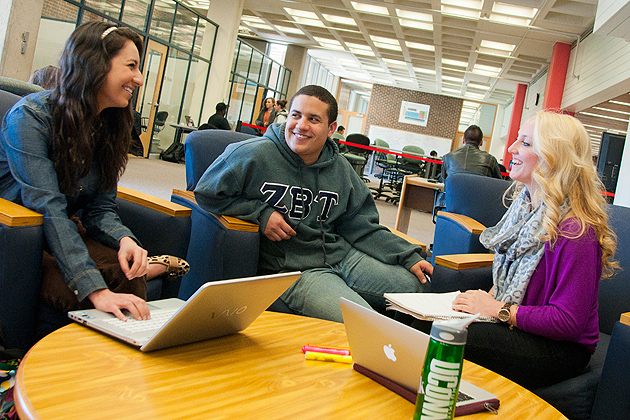With careful planning and the support of her University of Connecticut advisers, Sarah Brokaw ’11 (CLAS) was already established in her career when many of her peers were still studying for senior exams and ordering their graduation gowns.
Like many other UConn students, Brokaw was able to graduate from the University in three years rather than the standard four, creating cost-savings for the New Jersey native and continuing a tradition that UConn has fostered in highly motivated students for decades.

About 240 UConn students who enrolled between fall 2003 and fall 2008 completed their degree requirements in time to graduate in three years or less, according to university data. Nearly one in five of these was a minority student, a testament to UConn’s commitment to providing academic support across the spectrum of its diverse student body.
Students and UConn administrators point to a combination of factors that allow students to achieve this, and note that careful planning is the key to helping undergraduates put their college careers on the fast track.
It’s a desire that UConn recognized in its future undergraduates as early as 1955, when then-President Albert N. Jorgensen and his administration established the UConn Early College Experience program (previously known as the High School Co-op program) to help high school students get a jump on their university careers.
More than 9,000 high school juniors and seniors currently participate in the program, in which they take UConn courses taught by teachers in their schools who’ve been certified as UConn adjunct faculty members.
The Early College Experience program now offers about 50 courses in more than 20 disciplines at about 160 partner high schools, letting students build up credits for about one-tenth of the cost they’d pay to take the courses at a UConn campus.
Many students, including Brokaw, also enter UConn with credits they earned by performing well on the College Board’s Advanced Placement exams. Some also take courses during UConn’s intersession and summer sessions, or enroll in more courses than their peers during regular semesters.
“We are proud that as a research university, we offer different learning experiences for our talented and diverse student population and that so many of our students finish early and pursue graduate school and careers on their own schedule,” says Sally Reis, interim vice provost for academic affairs.
Nathan Fuerst, director of undergraduate admissions, says a growing number of students are coming to the University with credits from participating in the increasingly popular Early College Experience program during high school. Some already have nearly 30 credits completed before they arrive on campus, giving them the head start needed to make their three-year degree path a reality.
UConn undergraduates can also pursue a blended course arrangement that lets them include online or independent study courses and gives them more scheduling flexibility, he says.
Summer enrollment at UConn also offers reduced rates for housing and other services, helping students who want to pursue a three-year degree to avoid the cost of a full fourth year and get an earlier start in their careers or graduate programs.
“When a student’s objective is to graduate in three years or less, we can help them achieve this through a variety of strategies, working with their academic adviser,” Fuerst says.
Brokaw, an Honors Program graduate, worked with her advisers to meet that goal and says she’s glad she put in the effort.
She had enough credits from AP exams when she entered UConn that she was immediately classified as a sophomore, and had satisfied all of the science prerequisites and most of the mandatory credits in math and some other areas.
Brokaw, whose degree is in English and who minored in French, says careful planning – and the support of UConn professors and advisers – helped her craft her schedules so she could satisfy her other requirements, study abroad as part of the UConn in Paris program, and even squeeze in a horseback riding class for fun.
“I would tell people to make sure they plan everything out carefully and make sure that your professors and advisers know you intend to graduate in three years,” says Brokaw, who now works for Massachusetts-based MEDITECH to teach senior-level hospital officials to set up and use medical software, as well as providing troubleshooting for any issues they encounter.
In addition to the financial savings that can be achieved by graduating a year early, Brokaw says being able to show potential employers that she had the determination to graduate in three years rather than four also helped in her job hunt.
The Annandale, N.J., native teaches SAT preparation classes in her spare time and says she always encourages high school students to explore AP exams and other programs for early college credit. She says that graduating in three years requires persistence, but is worth the work.
“It was helpful to me at UConn that I made my intentions known as soon as I knew I wanted to graduate early,” she says. “The more professors who know you want to do that, and the more advisers who know you’re aiming for that, the more help you’re going to get in achieving it.”



